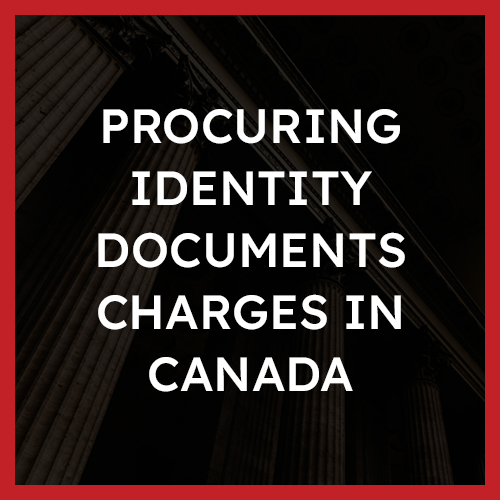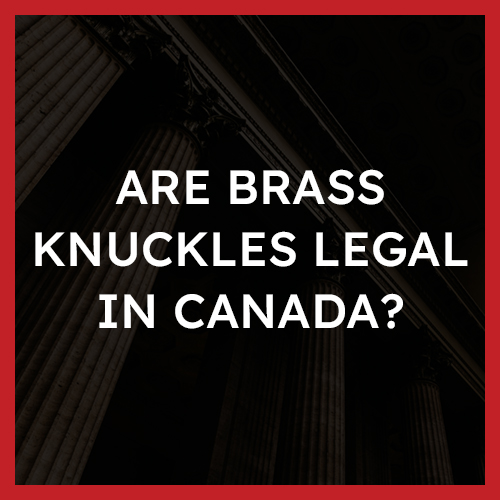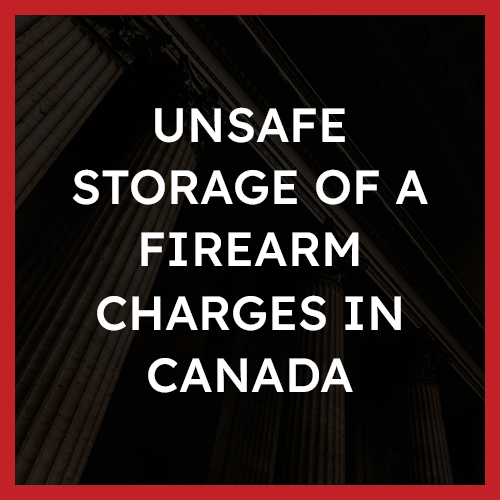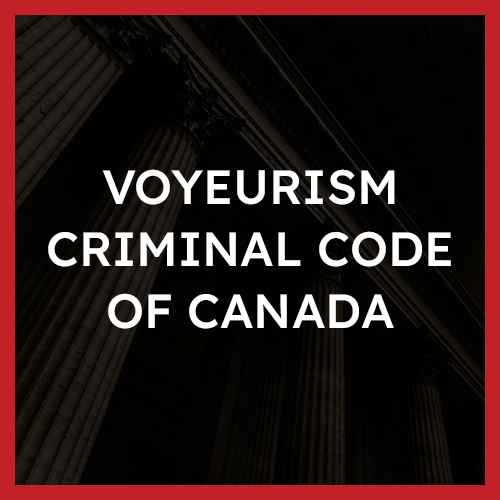Procuring Identity Documents Laws in Canada

A procuring identity documents charge occurs when an individual, without lawful excuse, procures to be made, possesses, transfers, sells or offers for sale identity documents. The identity documents in question must relate or purport to relate, in whole or in part, to another person. This charge does not occur when a person creates documents as part of their ordinary business or employment, has the consent of the other person, or procures identity documents for a legitimate purpose related to the administration of justice.
Procuring identity documents is a hybrid offence with a Crown election. This means that depending on the circumstances of your case the Crown can elect to proceed by indictment or summarily. If an accused is prosecuted by indictment, there is a Defence election of court under s. 536(2) of the Criminal Code.
Examples
Some examples of a procuring identity documents charge may include the following:
- The accused produced and sold a Social Insurance Number (SIN) card to an individual who the document does not relate to;
- The accused offers for sale a Birth Certificate to individuals whom the document does not relate to;
- The accused possesses a passport that relates to the identity of another person and purports it to be their own; and
- The accused create a death certificate that relates to the identity of another individual.
Defences
The defences available to a procuring identity charge are entirely dependent on the facts of your case.
However, some defences to a procuring identity documents charge may include:
- The accused was wrongly identified as the person who procured an identity document;
- The document procured was not an “identity document” for the purposes of this offence, as defined by the Criminal Code;
- The accused lawfully procured an identity document in good faith for the purposes of carrying out employment; and
- The accused had consent to procure an identity document on behalf of the person to whom the document relates.
Punishment
A procuring identity documents charge is a hybrid offence, which entails a maximum punishment as follows:
Imprisonment for a term not exceeding 5 years.
Punishments for a procuring identity documents charge under s. 56.1(1) depend on if the Crown elects to pursue the charge as an indictable offence or summarily. There are no mandatory minimum penalties for this offence. The maximum is no more than 5 years of incarceration if prosecuted by indictment. If prosecuted summarily, the maximum punishment is no more than 2 years less a day of incarceration and a potential fine of up to $5,000.
A procuring identity documents charge can also entail severe consequences for current and future employment opportunities and immigration status.
Overview of the Offence
According to s. 56.1(1) of the Criminal Code:
Taking motor vehicle or vessel or found therein without consent
335 (1) Subject to subsection (1.1), every one who, without the consent of thea
Procuring Identity Documents
56.1 (1) Every person commits an offence who, without lawful excuse, procures to be made, possesses, transfers, sells or offers for sale an identity document that relates or purports to relate, in whole or in part, to another person.
For greater certainty
(2) For greater certainty, subsection (1) does not prohibit an act that is carried out
(a) in good faith, in the ordinary course of the person’s business or employment or in the exercise of the duties of their office;
(b) for genealogical purposes;
(c) with the consent of the person to whom the identity document relates or of person authorized to consent on behalf of the person to whom the document relates, or of the entity that issued the identity document; or
(d) for a legitimate purpose related to the administration of justice.
Definition of identity document
(3) For the purposes of this section, identity document means a Social Insurance Number card, a driver’s licence, a health insurance card, a birth certificate, a death certificate, a passport as defined in subsection 57(5), a document that simplifies the process of entry into Canada, a certificate of citizenship, a document indicating immigration status in Canada, a certificate of Indian status or an employee identity card that bears the employee’s photograph and signature, or any similar document, issued or purported to be issued by a department or agency of the federal government or of a provincial or foreign government.
Punishment
(4) Every person who commits an offence under subsection (1)
(a) is guilty of an indictable offence and liable to imprisonment for a term of not more than five years; or
(b) is guilty of an offence punishable on summary conviction.
owner, takes a motor vehicle or vessel with intent to drive, use, navigate or operate it or cause it to be driven, used, navigated or operated, or is an occupant of a motor vehicle or vessel knowing that it was taken without the consent of the owner, is guilty of an offence punishable on summary conviction.
Exception
(1.1) Subsection (1) does not apply to an occupant of a motor vehicle or vessel who, on becoming aware that it was taken without the consent of the owner, attempted to leave the motor vehicle or vessel, to the extent that it was feasible to do so, or actually left the motor vehicle or vessel.
The Guilty Act (Actus Reus)
The actus reus for a procuring identity documents charge under s. 56.1(1) is established by proof, beyond a reasonable doubt, of the following:
- The accused procures to be made, transfers, sells or offers for sale an identity document that relates or purports to relate to, in whole or in part, to another person without lawful excuse.
The Guilty Mind (Mens Rea)
The mens rea for a procuring identity documents charge under s. 56.1(1) include proving, beyond a reasonable doubt, that:
- The accused procures identity documents that they had knowledge and control of, knowing that the documents relate to, or purport to relate, in whole or in part, to another person.
Defences
How to Beat a Procuring Identity Documents Charge
Every case is different. The availability and strength of any defence depend entirely on the specific facts of your case. The strength of any available defence rests on the evidence against you and the precise details of the allegations. However, the following are some common defences that may be used when fighting a procuring identity documents charge.
Factual innocence
The strongest defence against a procuring identity documents charge under s. 56.1(1) is to maintain that you are factually innocent. If you can show that the facts and the evidence do not support that you were procuring identity documents, then you may have a defence you were factually innocent.
Lawful excuse
Subsections (2) and (3) of s. 56.1(1) of the Criminal Code outline two potential exceptions for a procuring identity documents charge. Firstly, no person is guilty of a crime if they, in good faith, procure identity documents in the ordinary course of one’s business or employment, or in the execution of their office’s duties. Secondly, an individual cannot be held liable for this offence if the document procured is not an identity document as defined in the Criminal Code.
Consent
Subsection 2(c) of s. 56.1(1) of the Criminal Code also provides for lawful procuring of identity documents, provided that consent has been provided. If you can show that you procured identity documents with the consent of the person to whom the identity document relates or of a person authorized to consent on behalf of the person to whom the documents relates, you may have a defence to a procuring identity documents charge. You may also obtain consent from the entity that issued the document.
Identity
Depending on the circumstances of your case, a possible defence to a procuring identity documents charge may be to raise an identity defence. In this case, for this defence to be raised successfully, you will have to prove that you were not the person who procured identity documents.
Any applicable Charter defences
The Charter sets out your rights and freedoms before and after your arrest. If the police fail to abide by these rights deliberately or inadvertently, it could aid in your defence. If any of your Charter rights have been violated before or after your arrest, you may be able to have some or all of the evidence that the Crown is relying on to secure a conviction excluded under s. 24(2) of the Charter.
Punishments
The Criminal Code provides for a possible maximum term of imprisonment of no more than 5 years for those convicted of a procuring identity documents charge.
Persons found guilty of a procuring identity documents charge are eligible for sentencing entailing a discharge, suspended sentence, stand-alone fine, custody, custody with a fine or probation or a conditional sentence order.
Beyond any immediate jail and/or probation sentence you receive, there is also a discretionary DNA Order.
This is authorized as a secondary offence listed under s. 487.04 (c), (d) or (e), and the DNA order can be authorized regardless of if the Crown proceeds summarily or by indictment.
Frequently Asked Questions
Can you go to jail for procuring identity documents?
If you procure identity documents under s. 56.1(1) of the Criminal Code, you can go to jail. If the Crown proceeds by indictment, a procuring identity documents charge carries a maximum sentence of no more than five years in jail. If the Crown proceeds summarily, the maximum jail sentence is two years less a day. Therefore, there is a possibility that you can go to jail for a procuring identity documents charge.
What is the maximum penalty for a procuring identity documents charge?
The maximum penalty for procuring identity documents is 5 years if the Crown chooses to prosecute an accused by indictment. If the Crown chooses to proceed summarily, the maximum jail sentence is two years less a day, and a potential fine of up to $5,000.
Is procuring identity documents an indictable offence?
Procuring identity documents is a hybrid offence. This means that the Crown prosecutor can choose to prosecute someone charged with procuring identity documents either summarily or by indictment. If the Crown chooses to prosecute an accused by indictment, then if the accused is found guilty, they will be charged with an indictable offence.
Published Decisions
R v Smith, 2021 ONCA 310
Upon searching a residence located in Hamilton, Ontario, police found a driver’s license and multiple Ontario government health cards. The identification documents included a photo of the accused but displayed a different name and various dates of birth. The accused was charged under s. 56.1(1) of the Criminal Code. The trial judge emphasized that s. 56.1(1) requires the documents to relate to another, with no lawful authority for one’s possession. The central issue at trial was whether the accused had possession of the identity cards found in the Hamilton residence, and whether he had knowledge of them. The issue largely turned on the accused’s connection to the residence in arriving at a conclusion as to knowledge and possession.
The jury found that the accused guilty on his charges under s. 56.1(1), which was upheld on appeal. The accused was sentenced to 4 months incarceration.
You can read the full decision here.
R v Brown, 2023 ONSC 901
Police executed a search warrant in an apartment, and as part of their search, they entered a locked bedroom. Inside of this bedroom, police found over 100 grams of crystal meth, digital scales, and various pieces of government identification in the names of six different people. The homeowner was charged with 16 offences, including 6 charges under s. 56.1(1) of the Criminal Code. The central issue at trial was whether the Crown had proven beyond a reasonable doubt that the homeowner had knowledge and control of the drugs and government identity documents.
At trial, the defence argued that the room where the identity documents were found could have possibly been rented out on AirBnB. The Court rejected this argument, finding that it would require them to find that six different people rented out the room and all left their important government-issued identity documents behind. They found that the only reasonable inference available on the evidence was that the accused was in possession of the IDs, and the accused was found guilty on all 6 counts.
You can read the full decision here.
R v Robertson, 2017 BCSC 2402
Police executed a search warrant at the residence of the two accused, where they found several firearms, and stolen electronics. Police also found an Indian Status certificate, which had one of the accused’s pictures on it, but another individual’s name. The accused was charged with procuring identity documents, under s. 56.1(1) of the Criminal Code, among a number of other charges.
The defence argued that the accused could not be found guilty of his charge under s. 56.1(1), submitting that the Crown could not prove the existence of the real person to whom the identity card belongs to. The court found that the Crown was not required to relate the false identification to a real person.
The court found the accused guilty of his charge under s. 56.1(1) of the Criminal Code.
You can read the full decision here.
Contact Us
If you have been charged with a criminal offence, visit our location pages to contact our team.
About The Author
Ask A Question
We endeavor to respond to questions within 24 hours. If your matter is urgent, please call our office or submit a request for a free consultation.







